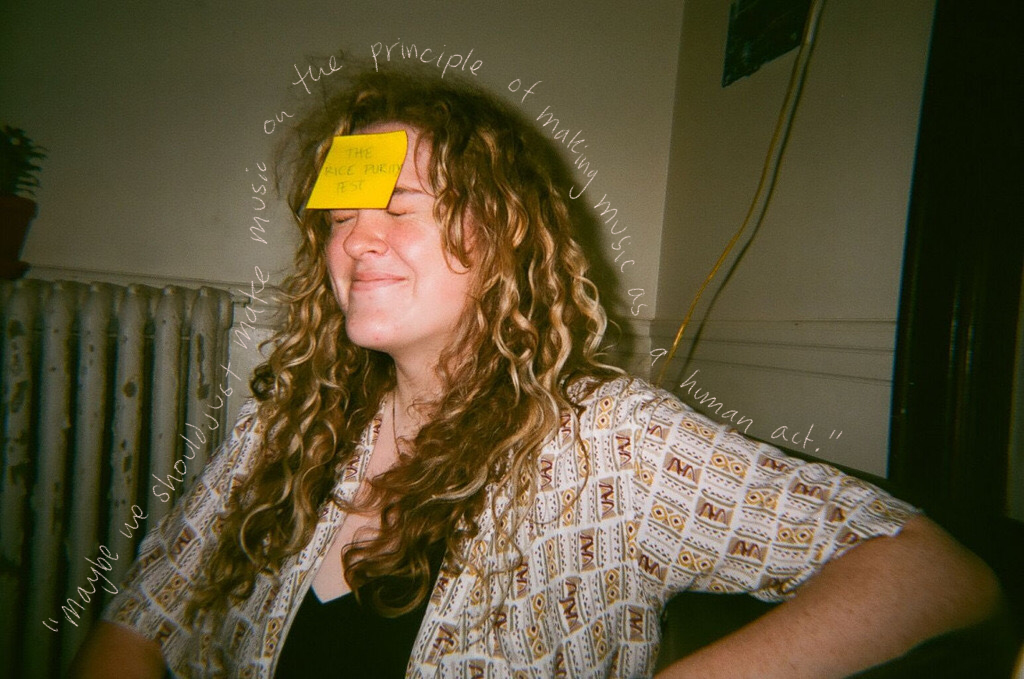The Poetic Irreverence of Cadderwall

By Anna Wojnarowski
Clem Cahill has just skated home from their bi-weekly Covid test. They text me that they might run a little late. I have nowhere to be but home so it doesn’t bother me too much. When we meet, fifteen minutes later via Zoom, they are in their wood-paneled room in Boston. “Hey, how’s it going!”
Clem Cahill, also known by their band name, Cadderwall, is a 21-year-old Boston University student from New Jersey. They started making music in high school, posting demos and singles to Soundcloud. However, they say that their growth as an artist started to flourish when they enrolled at BU in January of 2018: “I had to leave my hometown and start living my life to write meaningful music. Some people are introspective in themselves [but] I have to be stimulated, just get up to stuff because I mostly write from life and bad decisions.” Cadderwall, who most recently came out with their song “Lunch Poems” off the EP of the same name, showcases a departure from their discography’s pattern of sonic strings to an electric beat sound, though Cadderwall makes it clear that this was never on purpose. “I literally just made it because I didn’t have my guitar”, pausing, they run out of frame to show me the portable keyboard that they used. “I just did this fucking arpeggio and added the bass,” they say matter of factly. To them, the lyrics are the most important part of their songs: “For me, you can say more with poetry than you can with instrumental-only because I’m not a musician’s musician. I’m not a math rock polyrhythm person or anything,” they laugh offhandedly.
Their poetry, which is first written in their journal before put to music, has an uncanniness to Catholic allusions. Cadderwall points out that this isn’t something they go out of their way to do. However, they don’t deny the comparisons: “I think it’s funny to talk about it… I don’t want to pigeon-hole myself as a gay artist… but I guess I’m gay so that makes it kind of like the devotion and ritualistic ways that religion has applied to these dumb little debaucherous and fruity activities that we get up to.” These experiences that Cadderwall clings to as inspiration has been few and far inbetween since March. When I ask them how the pandemic has affected their touring schedule, Cadderwall decides to pitch me a tweet they’ve been working on: “I had a tour booked before Covid is like the musician’s version of oh, I’ve could’ve gone pro but I rolled my ankle. But that is literally what happened to me, like, I have this notes app note in my phone right now that had, like, fifteen shows between May 2020 and December 2020 so that’s kind of lame.”
These shows, including one at the now-defunct Great Scott venue in Allston, is especially crushing, “Great Scott closing was very very sad for me because I always wanted to play there, never got a chance to, I felt like it was the real nitty-gritty kind of Boston venue.” Great Scott, which was a staple of the indie Boston music scene for over forty years, was also the place where Cadderwall witnessed Mannequin Pussy in concert, a performance that Cadderwall proclaims rocked their world: “It was the way she [Marisa Dabice] sang songs on stage like she was writing them in that second. She still felt the impact of the words even after two years of that song being out. I was like, oh shit okay that’s punk rock and that’s performance….that’s the X factor to music, like that’s why we’re all doing it.” This drive that Cadderwall explains so many local artists have is something that is also driving them to keep going during the pandemic.
To Cadderwall, music will have to continue to find a way somehow, “I think people are trying, I think maybe the novelty of doing online stuff has kind of worn off….But I mean I think that music survives no matter what, like, we all have an inherent need to do it so I’m sure, I mean it’s not gonna be profitable and it’s probably not gonna be a career path for a while but I mean, I don’t have the answers but I don’t feel nihilistic about it at least.” Cadderwall has not stopped making music, but they say that to make music about the pandemic is something that they definitely do not want to do. “I don’t think that’s interesting. We all [quarantined] and we all know what it’s like and if I think about it, I don’t want to listen to a song about quarantine.” Continuing, they say that “you can be reflective on the times without being literal. Attitudes and motifs can reflect current events without being like really on the nose.”
Citing Nina Simone, Cadderwall makes the point that music both needs to be about the now but should not be so current that it becomes unbearably corny. Cadderwall’s music, which could not be more opposite to the songs that they find to be too theatrical, combines current cultural moments with their personal experiences in such specific subjectivity. Growth in songwriting and sound is very important to Cadderwall, however, at the end of the day, it’s just something to do: “I scrutinize myself [as an artist] but I’m kind of just doing this for fun and catharsis. There are so many white cis dudes that are doing whatever they want and getting accolades anyway so I don’t know, maybe we should just make music on the principle of making music as a human act.”